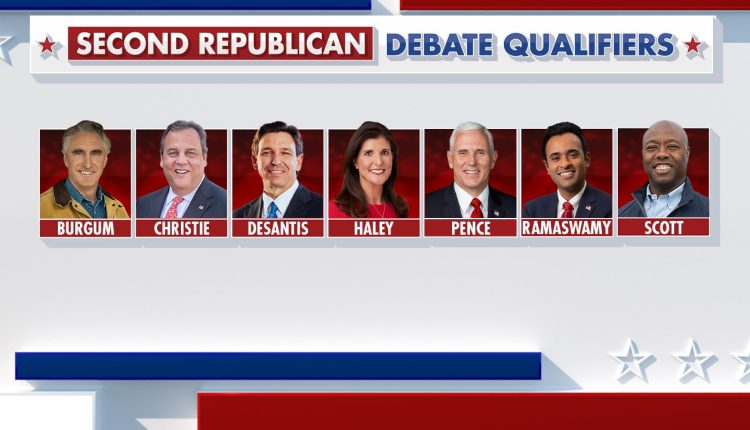A lot of people ask me… Do the debates matter? My response is: absolutely. Especially when it comes to the primaries.
Communication experts Mitchell McKinney and Benjamin Warner analyzed surveys of general election and primary debate viewers between 2000 and 2012 and discovered that 35% of primary election viewers changed their candidate preference as a result of a debate. That is certainly enough to make a difference even when the numbers look as they do today for Republicans.
So who wins the night at the Reagan Library on Wednesday? And how do they do it?
My response: he (or she) who frames the debate, wins the debate. And, right now there is only one candidate who is framing the debate in terms that matter most to voters.
GOP STRATEGISTS WARN 2024 PRESIDENTIAL CONTENDERS ‘CAN’T KEEP DANCING’ AROUND EACH OTHER AT SECOND DEBATE
Let me explain. The way you talk about something has the power to shape how people perceive it. That is what we call framing. In this case, it is the way each candidate positions themselves as the next Republican candidate for the president of the United States. Simply put, it helps us fill in the blank to a sentence like this “if I am voting for XYZ candidate because they are XYZ.”
You can always tell who wins the debate by the one who best answers that question. And the way they answer that question often isn’t about issues or knowledge. It is about something deep inside.
WHAT’S ON THE LINE FOR EACH OF THE GOP PRESIDENTIAL CANDIDATES ON THE DEBATE STAGE
They always tap into something that is truly emotional and visceral. And, years later you remember the underpinnings of the frame even if you didn’t support the candidate themselves.
- Biden in 2020: Though many polls underestimated the weight of his message, Biden framed his candidacy around a rallying cry, “We are in the battle for the soul of this nation.” And though, many didn’t think it would be enough, it was. And exit polling showed that his focus on protecting our democracy and the fight for the soul of the nation resonated enough to get him elected.
- Trump in 2016: Make America Great Again. His framing tapped into a yearning for the way things used to be. A belief that America can be the beacon it once was. And so, a vote for Donald Trump meant a return to American greatness – for everyone, not just the few.
- Obama in 2008: Obama announced his candidacy with a “House Divided” speech where he framed his story around a desire for hope and coming together. In his announcement, he focused on a belief in the “essential decency of the American people—where I came to believe that through this decency, we can build a more hopeful America.”
I could go back further, but you get the point. Frame the debate, win the election.
CLICK HERE TO READ ADDITIONAL DEBATE COVERAGE AND MORE ON FOX BUSINESS
And so, here we are. Just a day before the next presidential debate. Can it change the landscape? Absolutely. But it is going to require some major shifts by the candidates on the stage. Here is a look at a few of the candidates, paraphrasing their messages…
“…I’m an outsider who will get things done.” – Vivek Ramaswamy
“…I will fight the woke culture and protect your children.” – Ron DeSantis
“…I’m a true conservative.” – Mike Pence
“…I’m a pragmatist and will tell you the truth.” – Nikki Haley
“…I am running on hope and the American Dream.” – Tim Scott
“…They treat us unfairly. The system is rigged. They look down on us. I will fight back” – Donald J Trump
I don’t have to give a whole lot of commentary to see which candidate here is tapping into something much bigger.
A poll from Ipsos earlier this year suggested that nearly 7 in 10 Americans across political ideologies believe that the system is rigged to favor the elite. And 61% said they want a leader who can “take the country back.”
Only one can promise to do that. This election is about more than issues, more than personalities, this election is about defining who we want to be as a nation.
Whether right or wrong, Trump may be physically sitting out this debate, but he has already framed the reason to vote for him clearly. And so, without him on the stage in person, there is a lot of opportunity for others to frame their place in our hearts and minds.
Lee Carter is the president and partner of maslansky + partners, a language strategy firm based on the idea that “it’s not what you say, it’s what they hear” and author of “Persuasion: Convincing Others When Facts Don’t Seem to Matter.” Follow her on X, formerly know as Twitter, @lh_carter.
Read the full article here

